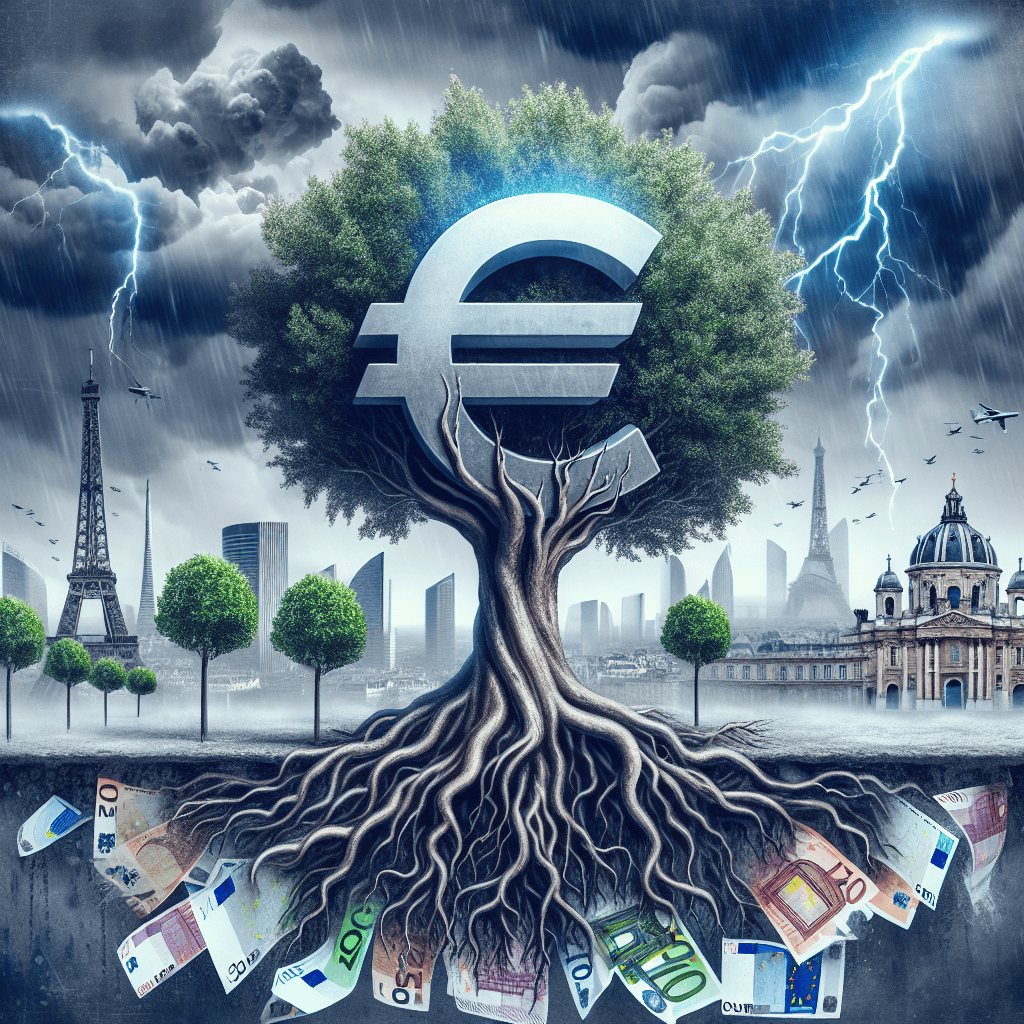“France: Navigating Challenges, Building Resilience.”
Introduction
France’s economic resilience has been a focal point of analysis amid a landscape marked by growing fiscal and political challenges. As one of Europe’s largest economies, France has demonstrated a robust capacity to navigate through periods of economic uncertainty, driven by a diverse industrial base, strong public institutions, and a commitment to social welfare. However, the nation faces significant hurdles, including high public debt, structural unemployment, and political pressures that demand comprehensive reforms. The interplay between maintaining economic stability and addressing these challenges is critical for France’s future growth and its role within the European Union. As global economic dynamics shift, France’s ability to adapt and implement effective policy measures will be crucial in sustaining its economic vitality and ensuring long-term prosperity.
France’s Economic Strategies in the Face of Political Unrest
France’s economic resilience has been a subject of considerable interest, particularly as the nation navigates a landscape marked by fiscal challenges and political unrest. In recent years, France has faced a series of economic hurdles, including high public debt, unemployment, and the need for structural reforms. These challenges have been compounded by political unrest, most notably the Yellow Vest protests and widespread strikes against pension reforms. Despite these obstacles, France has demonstrated a remarkable ability to adapt and maintain economic stability, largely due to a combination of strategic policy measures and inherent economic strengths.
One of the key strategies employed by France to bolster its economy has been the implementation of structural reforms aimed at enhancing competitiveness and fostering growth. The French government has undertaken significant labor market reforms to increase flexibility and reduce unemployment. By easing regulations and encouraging job creation, these reforms have sought to stimulate economic activity and improve the overall business environment. Additionally, France has focused on innovation and digital transformation as pivotal components of its economic strategy. Investments in technology and research have been prioritized to ensure that the country remains competitive in an increasingly digital global economy.
Moreover, France’s commitment to the European Union has played a crucial role in its economic resilience. As a founding member of the EU, France has benefited from the stability and economic opportunities provided by the single market. The country’s active participation in EU initiatives has facilitated trade and investment, contributing to economic growth. Furthermore, France’s alignment with EU fiscal policies has helped maintain fiscal discipline, even as it navigates domestic challenges. This alignment has been instrumental in preserving investor confidence and ensuring access to international financial markets.
In addition to these strategies, France’s diverse and robust economic base has been a significant factor in its resilience. The country boasts a well-developed industrial sector, a strong agricultural base, and a thriving services industry. This economic diversity has provided a buffer against sector-specific downturns and allowed for a more balanced economic performance. Furthermore, France’s cultural and historical appeal continues to attract millions of tourists each year, providing a steady stream of revenue and supporting the hospitality and retail sectors.
However, it is important to acknowledge the ongoing political challenges that France faces. The social unrest and protests reflect deep-seated concerns about economic inequality and social justice. Addressing these issues is crucial for ensuring long-term stability and cohesion. The French government has recognized the need for inclusive growth and has taken steps to address social disparities through targeted social programs and investments in education and healthcare. These efforts aim to create a more equitable society and mitigate the factors contributing to political unrest.
In conclusion, France’s economic resilience amid growing fiscal and political challenges is a testament to its strategic policy measures and inherent economic strengths. By implementing structural reforms, embracing innovation, and leveraging its position within the European Union, France has managed to maintain economic stability despite significant obstacles. While political unrest remains a concern, the country’s commitment to addressing social disparities and fostering inclusive growth offers a path forward. As France continues to navigate this complex landscape, its ability to adapt and innovate will be crucial in sustaining its economic resilience.
The Role of Innovation in Strengthening France’s Economy
France’s economy, one of the largest in Europe, has demonstrated remarkable resilience in the face of growing fiscal and political challenges. Central to this resilience is the role of innovation, which has become a cornerstone in strengthening the nation’s economic framework. As France navigates the complexities of a rapidly changing global landscape, innovation emerges as a critical driver of economic growth and stability.
In recent years, France has made significant strides in fostering an environment conducive to innovation. The government has implemented policies aimed at encouraging research and development, providing tax incentives for startups, and investing in digital infrastructure. These measures have not only attracted domestic entrepreneurs but have also drawn international tech giants to establish a presence in the country. Consequently, France has positioned itself as a hub for technological advancement, particularly in sectors such as artificial intelligence, biotechnology, and renewable energy.
Moreover, the French education system plays a pivotal role in nurturing a culture of innovation. With a strong emphasis on science, technology, engineering, and mathematics (STEM) education, France produces a highly skilled workforce capable of driving technological progress. The collaboration between academic institutions and industry further enhances this dynamic, facilitating the transfer of knowledge and the development of cutting-edge solutions to contemporary challenges.
In addition to fostering innovation through education and policy, France’s commitment to sustainability has also spurred economic growth. The transition to a green economy has opened new avenues for innovation, particularly in the fields of clean energy and sustainable agriculture. By investing in renewable energy sources and promoting eco-friendly practices, France not only addresses environmental concerns but also creates new jobs and stimulates economic activity. This dual focus on innovation and sustainability positions France as a leader in the global effort to combat climate change while simultaneously bolstering its economic resilience.
Furthermore, the rise of digitalization has transformed traditional industries, offering new opportunities for growth and efficiency. French companies are increasingly adopting digital technologies to enhance productivity and competitiveness. This digital transformation is evident across various sectors, from manufacturing to finance, where automation and data analytics are reshaping business models and driving economic expansion. By embracing digital innovation, France is better equipped to adapt to the evolving demands of the global market.
However, it is important to acknowledge the challenges that accompany this focus on innovation. The rapid pace of technological change can exacerbate existing inequalities, as certain regions or demographics may struggle to keep up with the advancements. To address this, France must ensure that the benefits of innovation are equitably distributed, providing support and resources to those at risk of being left behind. This includes investing in education and training programs to equip the workforce with the skills needed for the jobs of the future.
In conclusion, innovation plays a vital role in strengthening France’s economy amid growing fiscal and political challenges. By fostering a culture of innovation through supportive policies, education, and a commitment to sustainability, France has positioned itself as a leader in technological advancement. While challenges remain, particularly in ensuring equitable access to the benefits of innovation, France’s proactive approach offers a blueprint for economic resilience in an increasingly complex world. As the nation continues to navigate these challenges, the role of innovation will undoubtedly remain central to its economic success.
Navigating Fiscal Challenges: France’s Path to Economic Stability
France’s economic resilience has been a subject of considerable interest, particularly as the nation navigates a complex landscape of fiscal and political challenges. In recent years, France has demonstrated a remarkable ability to maintain economic stability despite facing numerous obstacles. This resilience can be attributed to a combination of strategic policy decisions, robust economic fundamentals, and a commitment to reform. However, the path to sustained economic stability is fraught with challenges that require careful navigation.
One of the primary fiscal challenges facing France is its high public debt, which has been exacerbated by the economic fallout from the COVID-19 pandemic. The French government has implemented a series of fiscal measures to support businesses and households, leading to a significant increase in public spending. While these measures were necessary to mitigate the immediate economic impact of the pandemic, they have also contributed to a growing fiscal deficit. Consequently, the government faces the daunting task of balancing the need for fiscal consolidation with the imperative to support economic growth.
In addition to fiscal challenges, France is also grappling with political pressures that complicate its economic landscape. The rise of populist movements and increasing public discontent with traditional political parties have created an environment of uncertainty. This political volatility can undermine investor confidence and hinder the implementation of necessary economic reforms. Nevertheless, the French government has shown a commitment to addressing these issues through dialogue and policy adjustments aimed at fostering social cohesion and economic inclusivity.
Despite these challenges, France’s economic fundamentals remain strong. The country boasts a diverse and dynamic economy, with key sectors such as aerospace, automotive, and pharmaceuticals driving growth. Moreover, France’s strategic position within the European Union provides it with access to a large and integrated market, enhancing its trade prospects. The government’s focus on innovation and digital transformation has also positioned France as a leader in the tech industry, further bolstering its economic resilience.
To navigate the current fiscal challenges, France has embarked on a series of structural reforms aimed at enhancing competitiveness and productivity. These reforms include labor market adjustments, tax incentives for businesses, and investments in infrastructure and education. By fostering a more flexible and dynamic labor market, France aims to reduce unemployment and increase workforce participation. Additionally, tax reforms are designed to attract foreign investment and stimulate domestic entrepreneurship, thereby driving economic growth.
Furthermore, France’s commitment to sustainable development and green energy transition is a critical component of its economic strategy. By investing in renewable energy and promoting environmentally friendly practices, France is not only addressing climate change but also creating new economic opportunities. This focus on sustainability is expected to yield long-term benefits, positioning France as a leader in the global green economy.
In conclusion, while France faces significant fiscal and political challenges, its economic resilience remains a testament to its strategic policy decisions and robust economic fundamentals. By continuing to implement structural reforms and fostering innovation, France is well-positioned to achieve sustained economic stability. However, the path forward requires careful navigation of fiscal constraints and political pressures, underscoring the importance of a balanced and inclusive approach to economic policy. As France continues to adapt to an ever-changing global landscape, its ability to maintain economic resilience will be crucial in securing a prosperous future.
The Impact of Global Trade on France’s Economic Resilience

France’s economic resilience has long been a subject of interest for economists and policymakers alike, particularly in the context of global trade dynamics. As one of the world’s largest economies, France plays a pivotal role in international markets, and its ability to withstand fiscal and political challenges is crucial not only for its own prosperity but also for the stability of the European Union. In recent years, the global trade environment has undergone significant transformations, with shifting alliances, trade wars, and the rise of protectionism. These changes have inevitably impacted France’s economic landscape, yet the nation has demonstrated a remarkable capacity to adapt and thrive.
To understand France’s economic resilience, it is essential to consider the country’s diversified economy, which serves as a buffer against external shocks. France boasts a robust industrial base, a thriving agricultural sector, and a dynamic services industry. This diversification allows the country to mitigate risks associated with global trade fluctuations. For instance, while the manufacturing sector may face challenges due to international competition or supply chain disruptions, the services sector, particularly tourism and finance, often compensates for these setbacks. Moreover, France’s commitment to innovation and technology has bolstered its competitiveness on the global stage, further enhancing its economic resilience.
In addition to economic diversification, France’s strategic trade partnerships have played a crucial role in sustaining its economic stability. The European Union remains France’s most significant trading partner, providing a vast market for French goods and services. The single market’s regulatory framework facilitates seamless trade, reducing barriers and fostering economic integration. Furthermore, France has actively sought to expand its trade relations beyond Europe, forging alliances with emerging economies in Asia, Africa, and Latin America. These efforts have not only diversified France’s export markets but also reduced its dependency on any single region, thereby enhancing its resilience to global trade disruptions.
However, France’s economic resilience is not without its challenges. The rise of protectionist policies worldwide poses a threat to the principles of free trade that underpin France’s economic strategy. Trade tensions between major economies, such as the United States and China, have created an unpredictable environment that can affect global supply chains and market access. In response, France has advocated for multilateralism and the strengthening of international trade institutions, emphasizing the importance of rules-based trade to ensure stability and predictability.
Moreover, domestic fiscal and political challenges also test France’s economic resilience. High public debt levels and budget deficits necessitate careful fiscal management to maintain investor confidence and economic growth. Additionally, political movements advocating for economic nationalism and skepticism towards globalization present potential obstacles to France’s trade policies. Nevertheless, the French government has demonstrated a commitment to addressing these issues through structural reforms aimed at enhancing competitiveness, improving labor market flexibility, and fostering innovation.
In conclusion, France’s economic resilience amid growing fiscal and political challenges is a testament to its diversified economy, strategic trade partnerships, and commitment to multilateralism. While global trade dynamics continue to evolve, France’s ability to adapt and thrive in this complex environment underscores its importance as a key player in the global economy. As the nation navigates the uncertainties of the future, its resilience will remain a critical factor in ensuring sustained economic growth and stability.
France’s Economic Policies: Balancing Growth and Stability
France’s economic resilience has been a subject of considerable interest, particularly as the nation navigates a complex landscape of fiscal and political challenges. In recent years, France has demonstrated a remarkable ability to balance growth and stability, a feat that can be attributed to a combination of strategic economic policies and adaptive governance. As the global economy faces uncertainties, France’s approach offers valuable insights into maintaining economic equilibrium.
To begin with, France’s economic policies have been characterized by a commitment to fostering growth while ensuring fiscal responsibility. The French government has implemented a series of reforms aimed at enhancing competitiveness and stimulating investment. For instance, labor market reforms have been introduced to increase flexibility and reduce unemployment, thereby encouraging businesses to expand and hire more workers. These measures have been complemented by tax incentives designed to attract foreign investment and support domestic enterprises. By creating a more conducive environment for business, France has managed to sustain economic growth even in the face of external pressures.
Moreover, France’s focus on innovation and technology has played a crucial role in its economic resilience. The government has prioritized investments in research and development, recognizing the importance of technological advancement in driving economic progress. Initiatives such as the French Tech Visa and the establishment of innovation hubs have positioned France as a leader in the tech industry, attracting talent and fostering entrepreneurship. This emphasis on innovation not only boosts economic growth but also enhances the country’s global competitiveness.
In addition to these economic strategies, France’s social policies have contributed to its stability. The French welfare system, known for its comprehensive coverage, provides a safety net that mitigates the impact of economic fluctuations on citizens. By ensuring access to healthcare, education, and social services, the government maintains social cohesion and reduces inequality. This social stability, in turn, supports economic resilience by fostering a more productive and engaged workforce.
However, France’s economic resilience is not without its challenges. The country faces significant fiscal pressures, particularly in light of rising public debt and budget deficits. Balancing the need for fiscal consolidation with the imperative to support growth remains a delicate task. The government has been working to address these issues through prudent fiscal management and structural reforms. Efforts to streamline public spending and improve tax efficiency are aimed at reducing the fiscal burden while maintaining essential services.
Furthermore, political challenges pose additional hurdles to France’s economic stability. The rise of populist movements and social unrest, exemplified by the Yellow Vest protests, reflect underlying discontent with economic inequality and perceived government inaction. Addressing these concerns requires not only economic solutions but also political engagement and dialogue. The French government has sought to address these issues through policy adjustments and increased public consultation, aiming to build trust and foster a sense of inclusion among citizens.
In conclusion, France’s economic resilience amid growing fiscal and political challenges is a testament to its strategic approach to balancing growth and stability. Through a combination of economic reforms, innovation, and social policies, France has managed to navigate a complex landscape while maintaining its economic equilibrium. Nevertheless, ongoing fiscal and political challenges necessitate continued vigilance and adaptability. As France moves forward, its ability to sustain this balance will be crucial in ensuring long-term economic prosperity and social cohesion.
The Influence of European Union Policies on France’s Economy
France’s economy, one of the largest in the European Union, has long been a subject of interest and analysis, particularly in the context of its resilience amid various fiscal and political challenges. The influence of European Union policies on France’s economic landscape is profound, shaping its fiscal strategies, trade relations, and regulatory frameworks. As a founding member of the EU, France has been both a beneficiary and a contributor to the union’s economic policies, which have played a crucial role in its economic stability and growth.
To begin with, the EU’s single market has been instrumental in facilitating trade and investment for France. By eliminating tariffs and reducing non-tariff barriers among member states, the single market has allowed French businesses to expand their reach across Europe, thereby boosting exports and creating jobs. This integration has been particularly beneficial for France’s automotive, aerospace, and agricultural sectors, which are key drivers of its economy. Moreover, the free movement of goods, services, capital, and labor within the EU has enabled France to attract foreign investment, further enhancing its economic resilience.
In addition to trade benefits, EU policies have also influenced France’s fiscal policies. The Stability and Growth Pact, which sets fiscal rules for EU member states, has compelled France to maintain budgetary discipline and control public debt. While this has sometimes been a source of tension, particularly during economic downturns, it has also encouraged France to implement structural reforms aimed at enhancing competitiveness and fostering sustainable growth. For instance, labor market reforms and efforts to streamline public administration have been partly driven by the need to comply with EU fiscal guidelines.
Furthermore, the European Central Bank’s monetary policy has had a significant impact on France’s economy. As a member of the Eurozone, France benefits from the ECB’s efforts to maintain price stability and support economic growth through measures such as low interest rates and quantitative easing. These policies have helped to stimulate domestic demand and investment, contributing to France’s economic resilience in the face of global uncertainties.
However, the influence of EU policies on France’s economy is not without challenges. The need to balance national interests with EU obligations can sometimes lead to political tensions, both domestically and within the union. For example, debates over agricultural subsidies, environmental regulations, and immigration policies often highlight the complexities of aligning national priorities with EU directives. Additionally, the rise of populist movements in France has occasionally fueled skepticism about the benefits of EU membership, posing a challenge to the country’s economic integration with the union.
Despite these challenges, France’s commitment to the EU remains strong, as evidenced by its active participation in shaping EU policies and initiatives. The country’s leadership in promoting a more integrated and cohesive Europe underscores its recognition of the EU’s role in enhancing economic resilience. As France continues to navigate fiscal and political challenges, the influence of EU policies will undoubtedly remain a key factor in its economic trajectory.
In conclusion, the interplay between European Union policies and France’s economy is a dynamic and multifaceted relationship that has significantly contributed to the country’s economic resilience. While challenges persist, the benefits of EU membership, including access to the single market, fiscal discipline, and monetary stability, have been instrumental in supporting France’s economic growth and stability. As the EU evolves, France’s ability to adapt and leverage these policies will be crucial in addressing future economic challenges and opportunities.
France’s Response to Global Economic Shifts and Domestic Pressures
France’s economic resilience in the face of mounting fiscal and political challenges has become a focal point of analysis for economists and policymakers alike. As the global economic landscape undergoes significant shifts, France finds itself navigating a complex web of domestic pressures and international uncertainties. The country’s ability to adapt and respond to these challenges is crucial for maintaining its economic stability and growth.
In recent years, France has faced a series of economic hurdles, including sluggish growth rates, high unemployment, and a burgeoning public debt. These issues have been exacerbated by global economic shifts, such as trade tensions, fluctuating commodity prices, and the ongoing impact of the COVID-19 pandemic. Despite these challenges, France has demonstrated a remarkable degree of economic resilience, underpinned by a robust industrial base, a skilled workforce, and a commitment to innovation.
One of the key factors contributing to France’s economic resilience is its diversified economy. Unlike some of its European counterparts, France has a well-balanced mix of industries, ranging from agriculture and manufacturing to services and technology. This diversification has allowed the country to absorb external shocks more effectively and maintain a steady growth trajectory. Moreover, France’s strategic investments in technology and innovation have positioned it as a leader in sectors such as aerospace, pharmaceuticals, and renewable energy, further bolstering its economic resilience.
In addition to its economic diversification, France has also implemented a series of structural reforms aimed at enhancing its competitiveness and fostering sustainable growth. These reforms have focused on improving labor market flexibility, reducing regulatory burdens, and promoting entrepreneurship. By creating a more conducive environment for business, France has been able to attract foreign investment and stimulate domestic economic activity. Furthermore, the government’s commitment to fiscal discipline has helped to stabilize public finances and restore investor confidence.
However, France’s economic resilience is not without its challenges. The country continues to grapple with high levels of public debt, which pose a significant risk to its long-term fiscal sustainability. Additionally, social and political tensions have emerged as a result of economic disparities and perceived inequalities. The rise of populist movements and widespread protests, such as the “Yellow Vest” demonstrations, have highlighted the need for inclusive economic policies that address the concerns of all citizens.
In response to these challenges, the French government has sought to implement policies that promote social cohesion and economic inclusivity. Initiatives such as increased investment in education and training, as well as targeted support for disadvantaged regions, aim to bridge the gap between different segments of society and ensure that the benefits of economic growth are more evenly distributed. Moreover, France’s active participation in the European Union and its commitment to multilateralism have enabled it to leverage international cooperation to address global economic challenges.
In conclusion, France’s economic resilience amid growing fiscal and political challenges is a testament to its ability to adapt and innovate in the face of adversity. While significant hurdles remain, the country’s diversified economy, structural reforms, and commitment to social inclusivity provide a solid foundation for future growth. As France continues to navigate the complexities of the global economic landscape, its experience offers valuable insights into the strategies and policies that can help nations thrive in an increasingly interconnected world.
Q&A
1. **Question:** What are the main fiscal challenges currently facing France?
– **Answer:** France is grappling with high public debt levels, budget deficits, and the need for pension reform to ensure long-term fiscal sustainability.
2. **Question:** How has France’s economy shown resilience despite these challenges?
– **Answer:** France’s economy has demonstrated resilience through strong industrial output, robust consumer spending, and a diversified economic base that includes sectors like aerospace, luxury goods, and technology.
3. **Question:** What role does the European Union play in supporting France’s economic resilience?
– **Answer:** The European Union supports France through financial mechanisms like the Recovery and Resilience Facility, which provides funding for economic reforms and investments, and by maintaining a stable single market.
4. **Question:** How are political challenges impacting France’s economic policies?
– **Answer:** Political challenges, such as social unrest and opposition to reforms, can delay or complicate the implementation of necessary economic policies, affecting investor confidence and economic stability.
5. **Question:** What measures has the French government taken to address unemployment?
– **Answer:** The French government has implemented labor market reforms, vocational training programs, and incentives for businesses to hire, aiming to reduce unemployment and increase workforce participation.
6. **Question:** How does France’s energy policy contribute to its economic resilience?
– **Answer:** France’s energy policy, which includes a strong focus on nuclear power and renewable energy, helps ensure energy security and price stability, supporting industrial competitiveness and economic resilience.
7. **Question:** What is the outlook for France’s economic growth in the near future?
– **Answer:** The outlook for France’s economic growth is cautiously optimistic, with expectations of moderate growth driven by domestic demand, government reforms, and recovery efforts post-pandemic, though risks remain from global economic uncertainties.
Conclusion
France’s economic resilience amid growing fiscal and political challenges can be attributed to several key factors. The country’s diversified economy, strong industrial base, and robust social welfare system have provided a buffer against external shocks. Additionally, France’s commitment to structural reforms, such as labor market adjustments and investment in innovation, has enhanced its competitiveness and adaptability. Despite facing fiscal pressures from high public debt and political challenges, including social unrest and policy disagreements, France has maintained steady economic growth. The government’s efforts to balance fiscal discipline with social equity have been crucial in sustaining public confidence and economic stability. However, ongoing challenges such as global economic uncertainties, demographic shifts, and the need for further reforms highlight the importance of continued strategic planning and policy innovation to ensure long-term resilience.





